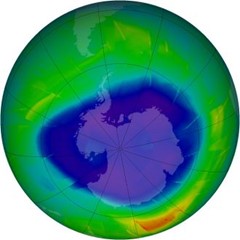
Ozone layer protection gives world a chance in climate crisis 
Modelling by climate scientists has found that the 1987 Montreal protocol curbing chlorofluorocarbons (CFCs) has given the world a chance of limiting global heating to 1.5C as set out by the Paris agreement.
The atmosphere has already warmed 1.1C to 1.2C above pre-industrial levels, meaning the Earth could have been facing 3.5C of warming if CFCs were still in use.
The modelling by teams in the UK, US and New Zealand was based on a theoretical rise in CFC use of 3% a year from 1987.
RAC apprentice numbers highest in a decade 
There’s positive news for the Refrigeration and Air Conditioning (RAC) sector, with numbers of apprentices and trainees enrolled at TAFEs around Australia at a ten-year high.
Annual growth of almost 14% saw total student numbers reach under 300,000 as of December 2020, according to the National Centre for Vocational Education Research (NCVER).
In NSW, there are currently more apprentices studying refrigeration and air conditioning than any other trade.
South Australian education provider TAFE SA recorded a massive 21.5% annual increase in apprentice and trainee enrolments in 2020. School-based commencements in South Australia have also increased by just over 20%.
RAC qualification upgrade
New, upgraded qualifications now apply as the basis for an ARC license.
The UEE Electrotechnology Training Package release 2 has been endorsed by the Department of Agriculture, Water and the Environment (DAWE) as the new refrigeration and air conditioning qualifications required for various refrigerant handling licences.
The current refrigeration and air conditioning (RAC) UEE qualifications and units of competency will continue to be recognised for the moment but registered training organisations (RTO) are encouraged to migrate to the newly endorsed refrigeration and air conditioning (RAC) UEE qualifications and units of competency by adding them to their scope of registration.
The new UEE Training Package is the most up to date qualification in relation to emission control and the safe handling of refrigerants included in the stationary sector, reflecting improved standards and current practice.
For further detail on licence categories to which the new qualifications package applies, please refer to the ARCTick website https://www.arctick.org/refrigerant-handling-licence/licence-types/
For additional information if required, please contact either Rod Cumming rcumming@arctick.org or Noel Munkman nmunkman@arctick.org
COVID-19 restriction information
We've created a webpage with links to up to date information on current working restrictions affecting their state.
The page makes finding infomation on COVID-19 restrictions affecting RAC work in each state easy, with helpful links to relevant sites. We'll be updating the page regularly to reflect changing COVID-19 restrictions and keep the RAC industry informed.
EV refrigerant advancement
Major Japanese air conditioner manufacturer, Daikin Industries, claims it's developed a refrigerant for EVs that can extend their range by up to 50%, with the exciting product scheduled for sale by 2025.
Daikin’s new refrigerant has a boiling point of approximately minus 40 degrees celsius, which is 10 to 15 degrees lower than competing products currently used by EV makers around the globe.
The new refrigerant will be tested by US industry group SAE International to verify its performance and safety under operating conditions.